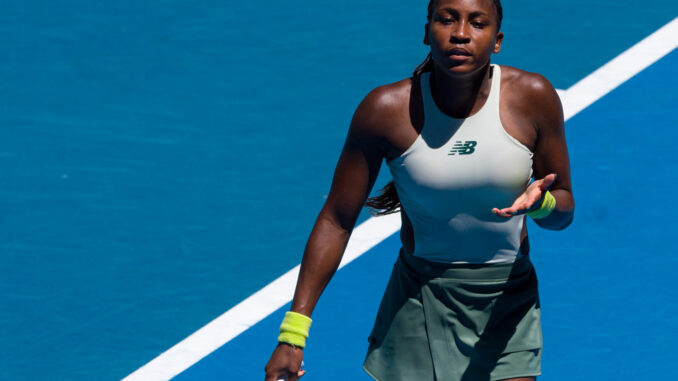
Coco Gauff, the 19-year-old tennis sensation and one of the brightest stars in women’s tennis, has once again captured attention at the Australian Open, not just for her exceptional performance in the first round but also for her thoughtful comments on a much-debated topic in the sport: on-court coaching. After securing her place in the second round with an impressive display of athleticism and skill, Gauff addressed the issue of whether players should be allowed to receive coaching during matches, offering insights into a practice that has divided opinion among players, coaches, and fans alike.
The young American’s views have added another layer to the ongoing discussion about the role of coaching in tennis, a sport traditionally celebrated for its emphasis on individual mental toughness and strategic autonomy.
Coco Gauff began her Australian Open campaign with a commanding win, delivering a performance that highlighted her growing maturity and consistent improvement as a player. Despite her age, Gauff has already become known for her composure under pressure, her tactical intelligence, and her ability to adapt mid-match. These qualities were on full display as she navigated her way past a challenging opponent, combining powerful groundstrokes, exceptional movement, and well-timed aggression to secure a straight-sets victory.
In her post-match interview, however, Gauff shifted focus from her victory to address the broader subject of on-court coaching. When asked about her stance on whether it should be allowed, she offered a nuanced perspective that reflected her understanding of the game and her respect for its traditions. Gauff acknowledged that while coaching can be beneficial in certain situations, especially for young and inexperienced players, the essence of tennis lies in the player’s ability to solve problems independently during a match.
“I think it’s a unique part of tennis that you’re out there alone, figuring things out on your own,” Gauff explained. “It’s one of the reasons I fell in love with the sport – the challenge of finding solutions without someone telling you exactly what to do.” Her remarks underline a sentiment shared by many purists of the game, who believe that the solitary nature of tennis is what sets it apart from other sports.
However, Gauff also recognized the evolving nature of tennis and the potential benefits of on-court coaching, particularly in modern-day competition, where technology, analytics, and physicality play increasingly significant roles. She pointed out that allowing coaching could level the playing field for players who might not yet have the experience to adapt to challenging situations or who struggle to adjust their strategies against seasoned opponents. “There are definitely moments when hearing from your coach could help you make adjustments faster, especially if you’re stuck in a pattern or if the momentum is shifting,” she added.
The issue of on-court coaching has long been a contentious one in tennis. While some tournaments, such as the WTA Tour, have experimented with allowing limited coaching interactions during matches, the Grand Slams have traditionally adhered to a stricter set of rules, prohibiting any form of direct communication between players and their coaches during play. This approach has been praised for preserving the integrity and individualistic nature of the sport, but it has also been criticized for being outdated, particularly as tennis evolves in the era of sports science and data-driven strategy.
Gauff’s thoughtful commentary comes at a time when the tennis community is grappling with questions about how to modernize the game while respecting its traditions. Proponents of on-court coaching argue that it reflects the realities of other professional sports, where athletes routinely receive guidance from coaches during games. They also point out that coaching often happens covertly, even when it’s officially prohibited, making the current rules difficult to enforce consistently.
Critics of on-court coaching, however, argue that it undermines the unique mental challenge of tennis, where players must rely on their own decision-making and problem-solving abilities to succeed. They worry that allowing coaching could diminish the importance of a player’s individual skill and intelligence, reducing the sport’s appeal as a test of one-on-one competition.
For Gauff, the question of on-court coaching is not just theoretical – it’s deeply personal. As one of the youngest players competing at the highest level, she has had to learn how to navigate the complexities of professional tennis while still developing her game. Her rapid rise to stardom has been fueled by her ability to adapt and grow, qualities that have been honed in part by the challenges of figuring things out on her own during matches.
At the same time, Gauff’s strong relationship with her father and coach, Corey Gauff, has played a pivotal role in her development as a player. The bond they share has been a source of strength and guidance throughout her career, making her perspective on the coaching debate particularly interesting. While she values the independence required in tennis, she also appreciates the insights and support her father provides off the court.
As the tennis world continues to debate the merits of on-court coaching, Gauff’s balanced perspective serves as a reminder of the complexity of the issue. Her ability to articulate both the advantages and potential drawbacks of coaching reflects her maturity and her deep understanding of the sport. For her, the question is not just about whether coaching should be allowed but about how to strike the right balance between preserving the essence of tennis and embracing the changes that could enhance the game.
As Gauff prepares for her second-round match at the Australian Open, she remains focused on her own journey, determined to continue improving and building on her impressive start to the season. Regardless of where the coaching debate ultimately leads, one thing is clear: Coco Gauff is not just a rising star on the court but also an intelligent and thoughtful voice in the sport. Her insights into the challenges and opportunities of modern tennis will undoubtedly contribute to the ongoing conversation about how the game evolves in the years to come.
Leave a Reply